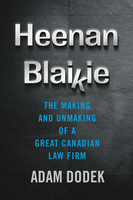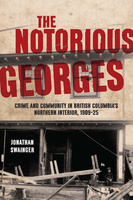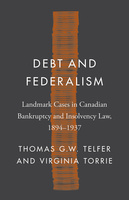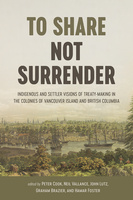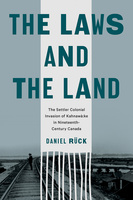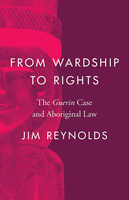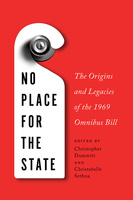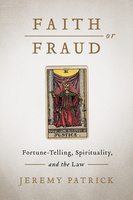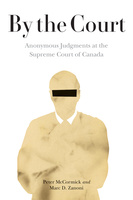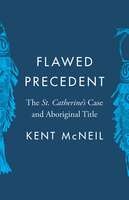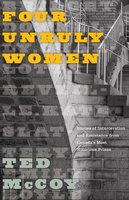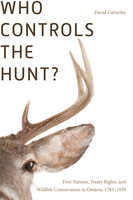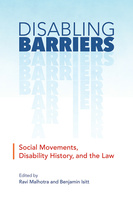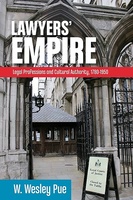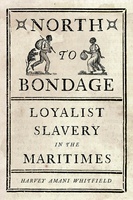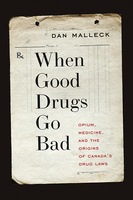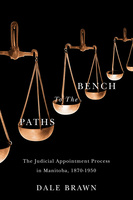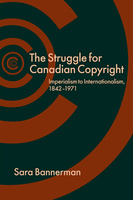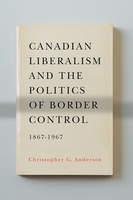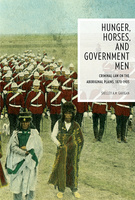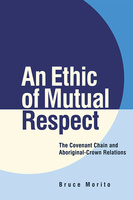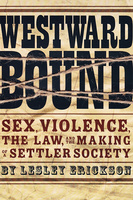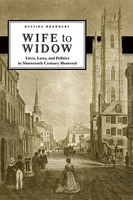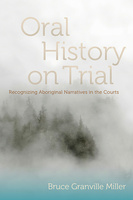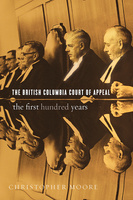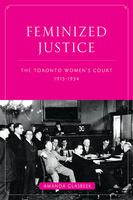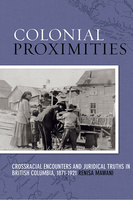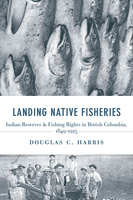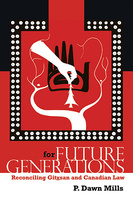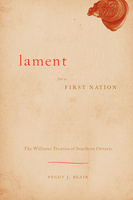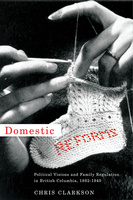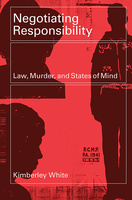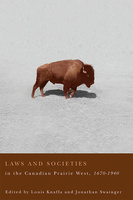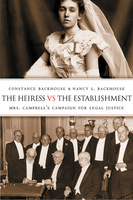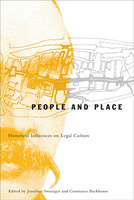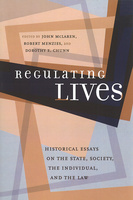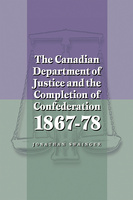Heenan Blaikie
The Making and Unmaking of a Great Canadian Law Firm
What really happened at Heenan Blaikie? This is the ultimate account of what went on behind the scenes of the largest law firm dissolution in Canadian history.
The Notorious Georges
Crime and Community in British Columbia's Northern Interior, 1905–25
The Notorious Georges is an engaging exploration of the alchemy of community identity and reputation in Prince George, BC, once branded Canada’s most-dangerous city.
Debt and Federalism
Landmark Cases in Canadian Bankruptcy and Insolvency Law, 1894-1937
Debt and Federalism is the first complete account of the Canadian federal bankruptcy and insolvency power, showing how four landmark cases form the bedrock of the modern bankruptcy system.
To Share, Not Surrender
Indigenous and Settler Visions of Treaty Making in the Colonies of Vancouver Island and British Columbia
To Share, Not Surrender presents multiple views and lived experience of the treaty-making process and its repercussions in the Colonies of Vancouver Island and British Columbia, and publishes, for the first time, the Vancouver Island Treaties in First Nations languages.
The Laws and the Land
The Settler Colonial Invasion of Kahnawà:ke in Nineteenth-Century Canada
The Laws and the Land, an original and impassioned account of the history of the relationship between Canada and Kahnawà:ke, reveals the clash of settler and Indigenous legal traditions and the imposition of settler colonial law on Indigenous peoples and land.
From Wardship to Rights
The Guerin Case and Aboriginal Law
This thoughtful and engaging examination of the Guerin case shows how it changed the relationship between governments and Indigenous peoples from one of wardship to one based on legal rights.
No Place for the State
The Origins and Legacies of the 1969 Omnibus Bill
No Place for the State is an incisive study that offers complex and often contrasting perspectives on the Trudeau government’s 1969 Omnibus Bill and its impact on sexual and moral politics in Canada.
Faith or Fraud
Fortune-Telling, Spirituality, and the Law
Faith or Fraud: Fortune-Telling, Individual Spirituality, and the Law answers an emerging controversy: Should the law’s understanding of religion include the “spiritual but not religious”?
By the Court
Anonymous Judgments at the Supreme Court of Canada
By the Court is the first major study of unanimous and anonymous legal decisions: the unique “By the Court” format used by the Supreme Court of Canada.
Flawed Precedent
The St. Catherine’s Case and Aboriginal Title
This illuminating account of the St. Catherine’s case of the 1880s reveals the erroneous assumptions and racism inherent in judgments that would define the nature and character of Aboriginal title in Canadian law and policy for almost a century.
Four Unruly Women
Stories of Incarceration and Resistance from Canada’s Most Notorious Prison
Filled with stories of pain, regret, and resistance, this chilling account of how four women survived their time at Kingston Penitentiary stands as an indictment of the idea that prisons and punishment are society’s answer to crime.
Who Controls the Hunt?
First Nations, Treaty Rights, and Wildlife Conservation in Ontario, 1783-1939
Tracing the connections between colonialism and the early conservation movement in Ontario, Who Controls the Hunt? examines the contentious issue of treaty hunting rights and the impact of conservation laws on First Nations.
Claire L’Heureux-Dubé
A Life
Going beyond jurisprudential legacy to provide rich sociocultural context, Claire L’Heureux-Dubé is an exploration of the controversial and historically transformative career of the first Quebec woman on Canada’s Supreme Court.
Disabling Barriers
Social Movements, Disability History, and the Law
In Disabling Barriers, legal scholars, historians, and disability-rights activists encourage us to rethink our understanding of both the systemic barriers disabled people face and the capacity of disabled people to effect positive societal change.
Lawyers’ Empire
Legal Professions and Cultural Authority, 1780-1950
In approaching the history of the legal professions through the lens of cultural history, Wes Pue locates the legal profession within England and its empire, supplementing and disrupting established narratives of professionalism as proffered by lawyers and their critics.
Fragile Settlements
Aboriginal Peoples, Law, and Resistance in South-West Australia and Prairie Canada
Fragile Settlements compares the historical processes through which British colonial authority was asserted over Indigenous people in southwest Australia and prairie Canada from the 1830s to the early twentieth century.
North to Bondage
Loyalist Slavery in the Maritimes
The first history of black slavery in the Maritimes, North to Bondage is a startling corrective to the enduring myth of Canada as a land of freedom at the end of the Underground Railroad.
When Good Drugs Go Bad
Opium, Medicine, and the Origins of Canada’s Drug Laws
This intoxicating look at the history of drug regulation in Canada reveals how a variety of social and political forces converged at the turn of the twentieth century to transform both public attitudes toward, and access to, narcotics.
Grit
The Life and Politics of Paul Martin Sr.
Grit examines the remarkable life and political career of Paul Martin Sr., a liberal reformer and cabinet minister from 1945 to 1968, who championed health care and pension rights, new meanings for Canadian citizenship, and internationalism in world affairs.
Paths to the Bench
The Judicial Appointment Process in Manitoba, 1870-1950
A close study of the judges appointed in early 20th-century Manitoba, revealing Canada’s highly political judicial appointment process.
The Struggle for Canadian Copyright
Imperialism to Internationalism, 1842-1971
The conflicts at the heart of international copyright are explored through the history of Canadian nation-building.
Canadian Liberalism and the Politics of Border Control, 1867-1967
This book chronicles the first century of Canadian border control, revealing how policies have been influenced by changing perceptions of the rights of non-citizens.
Hunger, Horses, and Government Men
Criminal Law on the Aboriginal Plains, 1870-1905
Tells the complex story of the relationship between Plains Indians and Canadian criminal law as it took root in their land.
An Ethic of Mutual Respect
The Covenant Chain and Aboriginal-Crown Relations
This book holds up the Covenant Chain, the historical treaty relationship between the British Crown and indigenous people in North America, as a model for building an ethic of mutual respect to guide modern treaty disputes and land claims.
City of Order
Crime and Society in Halifax, 1918-35
A groundbreaking exploration of the causes and consequences of Halifax’s tough-on-crime measures in the interwar era.
Westward Bound
Sex, Violence, the Law, and the Making of a Settler Society
Through the study of hundreds of criminal cases, Westward Bound explores how encounters between the courts and ordinary people on the Canadian Prairies contributed to the construction of race, class, and gender hierarchies in a settler society.
Wife to Widow
Lives, Laws, and Politics in Nineteenth-Century Montreal
The diversity of women’s lives as wives then as widows negotiating the law, patriarchy, family relationships, and the economy in 19th-century Montreal come alive in this first major study of widows in Canada.
Oral History on Trial
Recognizing Aboriginal Narratives in the Courts
This compelling analysis of Aboriginal, legal, and anthropological concepts of fact and evidence argues for the inclusion of Aboriginal oral histories in Canadian courts, and pushes for a reconsideration of the Crown's approach to oral history.
The Practice of Execution in Canada
The first comprehensive examination of execution as a social institution in Canada.
The British Columbia Court of Appeal
The First Hundred Years
An authoritative history of British Columbia’s highest court.
The Canadian War on Queers
National Security as Sexual Regulation
The Canadian War on Queers shows how the Canadian state used the ideology of national security to wage war on gays and lesbians.
Feminized Justice
The Toronto Women’s Court, 1913-34
Drawing on case files and newspapers accounts of women’s confrontations with the law in the Toronto Women’s Police Court, Feminized Justice offers a multifaceted portrait of women, crime, and courts in early twentieth-century Toronto.
Colonial Proximities
Crossracial Encounters and Juridical Truths in British Columbia, 1871-1921
Colonial Proximities traces the encounters between aboriginal peoples, mixed-race populations, Chinese migrants, and Europeans in late-nineteenth- and early-twentieth-century British Columbia.
Landing Native Fisheries
Indian Reserves and Fishing Rights in British Columbia, 1849-1925
For Future Generations
Reconciling Gitxsan and Canadian Law
Dawn Mills passionately shows how reconciliation can be achieved between Canada’s First Nations and the various levels of government.
Lament for a First Nation
The Williams Treaties of Southern Ontario
An important analysis of how the 1994 Howard decision on the Williams Treaties was based on erroneous cultural assumptions that favoured public over special rights.
Domestic Reforms
Political Visions and Family Regulation in British Columbia, 1862-1940
Negotiating Responsibility
Law, Murder, and States of Mind
Kimberly White provides an essential point of reference from which to evaluate current criminal law practices and law reform initiatives in Canada.
Let Right Be Done
Aboriginal Title, the Calder Case, and the Future of Indigenous Rights
Laws and Societies in the Canadian Prairie West, 1670-1940
Challenging myths about a peaceful west and prairie exceptionalism, the book explores the substance of prairie legal history and the degree to which the region's mentality is rooted in the historical experience of distinctive prairie peoples.
Our Box Was Full
An Ethnography for the Delgamuukw Plaintiffs
Daly explores the central meaning of the notion of land in the determination of Aboriginal rights with particular reference to the landmark Delgamuukw case that occupied the British Columbia courts from 1987 to 1997.
Despotic Dominion
Property Rights in British Settler Societies
Brings together the work of scholars whose study of the evolution of property law in the colonies recognizes the value in locating property law and rights within the broader political, economic, and intellectual contexts of those societies.
First Nations Sacred Sites in Canada's Courts
This book demonstrates how and why courts have failed to fairly treat First Nations sacred sites, which are under increasing threat worldwide due to state appropriation and insatiable demands on natural resources.
The Heiress vs the Establishment
Mrs. Campbell's Campaign for Legal Justice
A rare first-person account of Canada’s early twentieth century legal system, this books retells the Mrs. Campbell fourteen-year-battle with the Ontario legal establishment to claim her mother’s estate.
The Oriental Question
Consolidating a White Man's Province, 1914-41
Patricia E. Roy continues her study into why British Columbians were historically so opposed to Asian immigration.
People and Place
Historical Influences on Legal Culture
Regulating Lives
Historical Essays on the State, Society, the Individual, and the Law
This collection explores the treatment of incest in the criminal courts, racial-ethnic dimensions of alcohol regulation, public health initiatives around venereal disease, and the seizure and indoctrination of Doukhobor children, among other issues.
The Canadian Department of Justice and the Completion of Confederation 1867-78
Drawing on legal records and other archival documents, Jonathan Swainger considers the growth and development of the ostensibly apolitical Department of Justice in the eleven years after the union of 1867.

